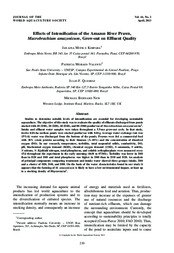Effects of intensification of the Amazon River Prawn, Macrobrachium amazonicum, grow-out on effluent quality.
Effects of intensification of the Amazon River Prawn, Macrobrachium amazonicum, grow-out on effluent quality.
Author(s): KIMPARA, J. M.; MORAES-VALENTI, P.; QUEIROZ, J. F. de; NEW, M. B.
Summary: Studies to determine suitable levels of intensification are essential for developing sustainable aquaculture. The objective of this study was to evaluate the quality of effluents discharged from ponds stocked with 10 (D10), 20 (D20), 40 (D40), and 80 (D80) postlarvae of Macrobrachium amazonicum/m2. Intake and effluent water samples were taken throughout a 5.5-mo grow-out cycle. In that study, twelve 0.01-ha earthen ponds were stocked postlarvae with 0.01 g. Average water exchange rate was 15%/d; water was discharged from the bottom of the ponds. Prawns were fed a commercial feed with 38% crude protein according to their biomass (3?10%) and the concentration of dissolved oxygen (DO). In our research, temperature, turbidity, total suspended solids, conductivity, DO, pH, biochemical oxygen demand (BOD), chemical oxygen demand (COD), N-ammonia, N-nitrite, N-nitrate, N-Kjeldahl nitrogen, total phosphorus, and soluble orthophosphate were measured every 15 d throughout the experiment in the early morning (0630 to 0730 h). Turbidity was lower in D10 than in D20 and D40 and total phosphorus was higher in D80 than in D10 and D20. An analysis of principal components comparing treatments and intake water showed three groups: intake, D10 and a cluster of D20, D40, and D80. On the basis of the water characteristics found in our study it appears that the farming of M. amazonicum is likely to have a low environmental impact, at least up to a stocking density of 80 prawns/m2.
Publication year: 2013
Types of publication: Journal article
Unit: Embrapa Mid-North
Keywords: Aquicultura, Desenvolvimento sustentável, Tanque, Tratamento da água
Observation
Some of Embrapa's publications are published as ePub files. To read them, use or download one of the following free software options to your computer or mobile device. Android: Google Play Books; IOS: iBooks; Windows and Linux: Calibre.
Access other publications
Access the Agricultural Research Database (BDPA) to consult Embrapa's full library collection and records.
Visit Embrapa Bookstore to purchase books and other publications sold by Embrapa.

